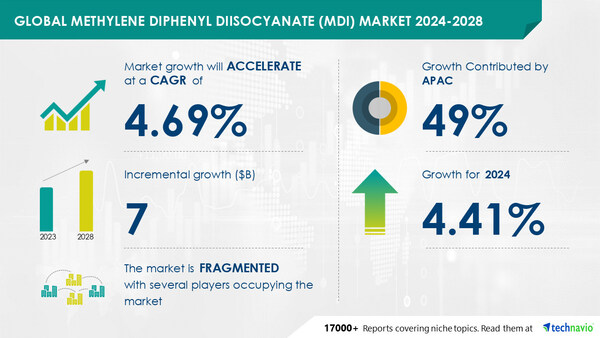NEW YORK, Aug. 14, 2024 /PRNewswire/ — The global methylene diphenyl diisocyanate (MDI) market size is estimated to grow by USD 7 billion from 2024-2028, according to Technavio. The market is estimated to grow at a CAGR of almost 4.69% during the forecast period. Growing demand for mdi from emerging economies is driving market growth, with a trend towards initiatives for expansion of mdi production capacity. However, stringent shipping regulations for mdi poses a challenge. Key market players include BASF SE, Changzhou JLON Composite Co. Ltd., Chongqing ChangFeng Chemical Co. Ltd, Covestro AG, Dow Chemical Co., Everchem Specialty Chemicals, Gomati Impex Pvt Ltd, Hexion Inc., Huntsman International LLC, Isotherm Puf Panel Pvt. Ltd., Kumho Petrochemical Co. Ltd., Kurmy Corp., Lanxess AG, Redox Ltd., Sadara Chemical Co., Shilpa Chemspec International Pvt. Ltd., Shri Salasar Traders, Tosoh Corp., and Wanhua Chemical Group Co. Ltd..
Get a detailed analysis on regions, market segments, customer landscape, and companies – Click for the snapshot of this report
|
Forecast period |
2024-2028 |
|
Base Year |
2023 |
|
Historic Data |
2018 – 2022 |
|
Segment Covered |
End-user (Construction, Furniture and interiors, Electronics and appliances, Automotive, and Others), Product (Rigid foam, CASE, Flexible foam, and Others), and Geography (APAC, Europe, North America, South America, and Middle East and Africa) |
|
Region Covered |
APAC, Europe, North America, South America, and Middle East and Africa |
|
Key companies profiled |
BASF SE, Changzhou JLON Composite Co. Ltd., Chongqing ChangFeng Chemical Co. Ltd, Covestro AG, Dow Chemical Co., Everchem Specialty Chemicals, Gomati Impex Pvt Ltd, Hexion Inc., Huntsman International LLC, Isotherm Puf Panel Pvt. Ltd., Kumho Petrochemical Co. Ltd., Kurmy Corp., Lanxess AG, Redox Ltd., Sadara Chemical Co., Shilpa Chemspec International Pvt. Ltd., Shri Salasar Traders, Tosoh Corp., and Wanhua Chemical Group Co. Ltd. |
Key Market Trends Fueling Growth
The demand for polyurethane products, utilizing methylene diphenyl diisocyanate (MDI) as a primary raw material, is expanding across various industries, including automotive, furniture, bedding, and construction. This growth is driven by the enhanced properties of polyurethane products. In response, MDI manufacturers are expanding or restructuring their production facilities to meet the increasing demand and cater to the volatility in these industries. In July 2022, BASF SE announced an expansion of its MDI production capacity at its Geismar site, reaching 600,000 metric tons per year by the mid-decade. Similarly, European MDI producers are restructuring their facilities to address economic uncertainties. These developments are projected to positively influence the growth of the global MDI market.
The Methylene Diphenyl Diisocyanate (MDI) market is thriving, driven by trends in various industries. In thermal insulation, MDI’s chemical resistance and mechanical strength make it a preferred choice. In electronics, MDI’s role in producing flexible PU foams for components and casings is significant. The automotive sector uses MDI for lightweight, fuel-efficient parts like flexible foams for seating and insulation. BASF’s Lupranat ZERO, a low-emission MDI, caters to environmental regulations. Technological developments include renewable resources like soybean oil for ecofriendly MDI production. AI and production process optimization boost efficiency. New materials like flexible packaging, coating adhesives, and sports & leisure products expand applications. The construction industry’s expansion fuels demand for insulation, with energy-efficient buildings using both rigid and spray foam. The Pure MDI segment serves automotive components and upholstered furniture, while sustainable products cater to bedding and carpet markets. International trade and the automotive sector’s growth further boost demand.
Discover 360° analysis of this market. For complete information, schedule your consultation- Book Here!
Market Challenges
• The global Methylene Diphenyl Diisocyanate (MDI) market is experiencing significant demand due to its extensive use in various industries such as automotive, construction, and furniture. However, the growth of this market is being hindered by stringent regulations governing the shipping of MDI. These regulations, imposed by organizations like the International Civil Aviation Organization (ICAO), International Maritime Organization (IMO), the United States Department of Transportation (USDOT), and the International Maritime Dangerous Goods Code (IMDG), among others, impose precise requirements on the transport of MDI by sea, rail, or road. These regulations pose a challenge to the free movement of MDI products and may negatively impact the growth of the global MDI market during the forecast period.
• The Methylene Diphenyl Diisocyanate (MDI) market faces several challenges in various industries. In rigid PU foam production, commercial applications require energy efficiency, reduced project weight, and weather resistance. Insulated panels, gap fillers, and one-component foams are key areas where MDI excels in sealing gaps and covering irregular shapes. For infrastructure investment in renewable energy, roads and highways, urban infrastructure, railways, and motor vehicle production, MDI’s excellent bond strength and durability make it an essential raw material. In the construction sector, MDI is used in buildings, window assembly, heat insulation, waterproof barriers, and fire insulation. MDI is also used in infilling applications, such as PU adhesives, and in the production of aromatic isocyanate, which is a raw material for polyurethane. However, handling and containment of MDI and its derivatives, such as Pure MDI, Polymeric MDI, and Modified MDI, pose challenges due to their reactivity. The Trade Administration, OICA, and industries using MDI, like furniture and electronic appliances, must adhere to regulations and ensure safe handling practices.
For more insights on driver and challenges – Download a Sample Report
Segment Overview
This methylene diphenyl diisocyanate (mdi) market report extensively covers market segmentation by
- End-user
- 1.1 Construction
- 1.2 Furniture and interiors
- 1.3 Electronics and appliances
- 1.4 Automotive
- 1.5 Others
- Product
- 2.1 Rigid foam
- 2.2 CASE
- 2.3 Flexible foam
- 2.4 Others
- Geography
- 3.1 APAC
- 3.2 Europe
- 3.3 North America
- 3.4 South America
- 3.5 Middle East and Africa
1.1 Construction- Methylene Diphenyl Diisocyanate (MDI) is a widely used chemical in various industries due to its desirable properties, including lightweight, strength, durability, and flexibility. It is an effective insulating agent, making it ideal for filling wall cavities without damaging the walls. MDI provides excellent resistance to air infiltration and is used in the production of rigid foams, coatings, sealants, and adhesives. The increasing demand for spray polyurethane foam is expected to boost MDI consumption in the industry. With approximately 753,000 employers and over 7.8 million employees, the US construction industry generates nearly USD1.8 trillion worth of projects annually. The continuous growth of construction projects will drive the global MDI market during the forecast period.
For more information on market segmentation with geographical analysis including forecast (2024-2028) and historic data (2018 – 2022) – Download a Sample Report
Learn and explore more about Technavio’s in-depth research reports
The global polyols market is experiencing robust growth, driven by rising demand in the construction and automotive industries. Polyols, essential in producing polyurethane foams, are crucial for insulation and cushioning applications. Market segmentation includes polyether and polyester polyols, with significant demand in regions like North America, Europe, and Asia-Pacific. Key players, such as BASF and Dow, are expanding production capacities to meet growing demand. The market is expected to witness continued growth, supported by innovations in sustainable polyol production and increasing usage in diverse industries.
Research Analysis
Methylene Diphenyl Diisocyanate (MDI) is a versatile aromatic isocyanate used in the production of various chemicals and polymers. It is primarily utilized in the manufacturing of Polyurethane (PU) foams for construction insulation, automotive applications, and window assembly. MDI also finds extensive use in coatings, adhesives, elastomers, binders, and infilling materials. MDI is a crucial raw material for producing phosgenefree MDI, which is preferred due to its reduced toxic effects. The production of MDI involves the reaction of Aniline, Formaldehyde, and Water. The handling and containment of MDI require stringent safety measures due to its toxic nature. MDI’s primary applications include heat insulation, waterproof barriers, and fire insulation. Its use in PU foams has gained significant traction due to their excellent insulating properties. The global MDI market is witnessing robust growth, driven by increasing demand from the construction and automotive industries. The market’s production capacity is expected to expand further due to ongoing investments in research and development. Despite its benefits, MDI production and use are subject to various regulations due to its toxic effects. Proper safety measures and adherence to regulations are essential to ensure safe handling and usage of MDI.
Market Research Overview
Methylene Diphenyl Diisocyanate (MDI) is a versatile aromatic isocyanate used in the production of various products, including construction materials, automotive components, and polyurethane (PU) foams, coatings, adhesives, elastomers, binders, insulation, and more. MDI is essential in construction for insulated panels, gap fillers, and rigid PU foam, enhancing energy efficiency and reducing project weight. In the automotive industry, it is used in the production of motor vehicles, particularly in the manufacture of PU foams for seat cushions and headrests. MDI is also used in various industries such as furniture, electronic appliances, and infrastructure development, including roads and highways, railways, and urban infrastructure. Regulations regarding toxic effects and phosgene-free MDI have been implemented to ensure safety and environmental sustainability. Technological developments have led to the production of phosgene-free MDI, as well as ecofriendly MDI derived from renewable resources like soybean oil. The handling and containment of MDI require careful consideration due to its reactivity. MDI is produced from raw materials such as aniline, formaldehyde, and water, and its production process is undergoing optimization through the use of artificial intelligence. The market for MDI continues to grow, driven by increasing demand for energy-efficient insulation, weather-resistant coatings, and high-performance adhesives.
Table of Contents:
1 Executive Summary
2 Market Landscape
3 Market Sizing
4 Historic Market Size
5 Five Forces Analysis
6 Market Segmentation
- End-user
- Construction
- Furniture And Interiors
- Electronics And Appliances
- Automotive
- Others
- Product
- Rigid Foam
- CASE
- Flexible Foam
- Others
- Geography
- APAC
- Europe
- North America
- South America
- Middle East And Africa
7 Customer Landscape
8 Geographic Landscape
9 Drivers, Challenges, and Trends
10 Company Landscape
11 Company Analysis
12 Appendix
About Technavio
Technavio is a leading global technology research and advisory company. Their research and analysis focuses on emerging market trends and provides actionable insights to help businesses identify market opportunities and develop effective strategies to optimize their market positions.
With over 500 specialized analysts, Technavio’s report library consists of more than 17,000 reports and counting, covering 800 technologies, spanning across 50 countries. Their client base consists of enterprises of all sizes, including more than 100 Fortune 500 companies. This growing client base relies on Technavio’s comprehensive coverage, extensive research, and actionable market insights to identify opportunities in existing and potential markets and assess their competitive positions within changing market scenarios.
Contacts
Technavio Research
Jesse Maida
Media & Marketing Executive
US: +1 844 364 1100
UK: +44 203 893 3200
Email: [email protected]
Website: www.technavio.com/
SOURCE Technavio



